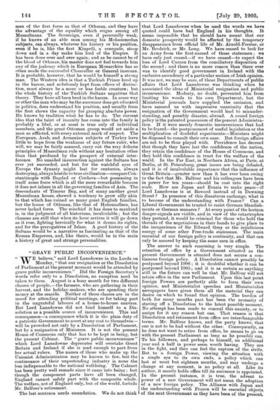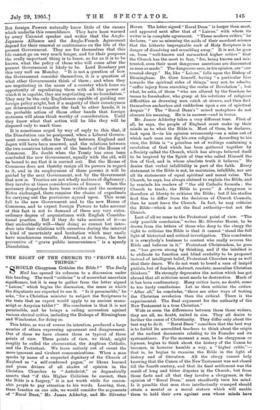Monday, "that our resignation or the Dissolution of Parliament at
the present moment would be attended by grave public inconvenience." Did the Foreign Secretary's words refer only to a Dissolution, no exception need be taken to them. August is a busy month for two different classes of people,—the farmers, who are gathering in their harvest, and the holiday-makers, who are spending their money at the seaside. Neither of these classes are in the mood for attending political meetings, or for taking part in the ungrateful labours of a house-to-house canvass. But Lord Lansdowne did not bind himself to a Dis- solution as a possible source of inconvenience. This sad consequence—a consequence which it is the plain duty of a patriotic Government to avert at any cost to themselves— will be provoked not only by a Dissolution of Parliament, but by a resignation of Ministers. It is not the present House of Commons only that has to be kept in being, but the present Cabinet. The "grave public inconvenience" which Lord Lansdowne deprecates will overtake Great Britain and Ireland if she is mad enough to part from her actual rulers. The names of those who make up the Unionist Administration may be known to few, but the continuance of their unpretending industry is none the less indispensable to the national welldoing. The Cabinet has been pretty well remade since it came into being ; but though the component parts have all been changed, England cannot safely part with the composite whole. The welfare, not of England only, but of the world, forbids Mr. Balfour's retirement.
The last sentence needs emendation. We do not think that Lord Lansdowne when he used the words we have quoted could have had England in his thoughts. It seems impossible that he should have meant that our domestic prosperity would be affected by the temporary disappearance from official life of Mr. Arnold-Forster, or Mr. Brodrick, or Mr. Long. We have ceased to look for an Army from the first-named of these statesmen ; we have only just ceased—if we have ceased—to expect the loss of Lord Curzon from the conciliatory disposition of the second ; and there is no more reason than there ever was to identify good government in Ireland with the exclusive ascendency of a particular section of Irish opinion. It was not, we may be sure, of these Departments of public affairs that Lord Lansdowne was thinking when he associated the ideas of Ministerial resignation and public inconvenience. Modesty, no doubt, prevented him from limiting his words to his own Department, but the Ministerial journals have supplied the omission, and have assured us with impressive unanimity that the resignation of the Government would lead to misunder- standing, and possibly disaster, abroad. A sound foreign policy is the patented possession of the present Administra- tion. If it were merely domestic inconvenience that had to be feared—the postponement of useful legislation or the multiplication of doubtful experiments—Ministers might be disposed to consult their own ease. But foreign affairs are not to be thus played with. Providence has decreed that though they have lost the confidence of the nation, they retain the confidence of the House of Commons, and they hold this confidence in trust for the welfare of the world. In the Far East, in Northern Africa, at Paris, at Berlin, at St. Petersburg, great issues are being debated, and it is of incalculable importance that the influence of Great Britain—greater now than it has ever been owing to the fact that Mr. Balfour and his colleagues have been in power for ten years—should be cast into the right scale. How are Japan and Russia to make peace—if Lord Lansdowne is at Bowood instead of in Downing Street ? In presence of this disastrous exchange, what is to become of the understanding with France? Can a, Liberal Government be trusted to resist German blandish- ments or German menaces ? At every point of the horizon danger-signals are visible, and in view of the catastrophes they portend, it would be criminal for those who hold the threads of the negotiations in their hands to give place to the inexperience of Sir Edward Grey or the injudicious energy of some other Free-trade statesman. The main essential of our foreign policy is continuity, and that can only be assured by keeping the same men in office.
The answer to such reasoning is very simple. The retention of office by a Government situated as the present Government is situated does not secure a con- tinuous foreign policy. A Dissolution cannot possibly be postponed beyond 1906; it is doubtful whether it can be postponed beyond 1905; and it is as certain as anything still in the future can well be that Mr. Balfour will not retain office in the new Parliament. Upon this last point foreign Powers are perfectly able to form their own opinion, and Ministerialist speeches and Minister ialist newspapers have given them all the material they can desire on which to found that opinion. The burden of both for many months past has been the necessity of staving off a Dissolution to the latest possible moment. No attempt has been made to conceal this anxiety, or to assign for it any reason but one. That reason is that Dissolution and retirement from office are interchangeable terms. Mr. Balfour knows, and the party knows, that one is not to be had without the other. Consequently, as he does not want to retire from office, he means to go on with the present Parliament as long as he possibly can. To his followers, and perhaps to himself, an additional year and a half in power seem worth having. They are in the fight, and they can feel the rapture of the strife. But to a foreign Power, viewing the situation with a single eye to its own ends, a policy which can last at most but eighteen months, and may undergo a change at any moment, is no policy at all. Like its author, it merely holds office till its successor is appointed. In the present instance, it is true, the advent to power of a new Government will not mean the adoption of a new foreign policy. The Alliance with Japan and the understanding with France will be essential objects, of the text Government as they have been of the present. But foreign Powers naturally know little of the causes which underlie this resemblance. They have been warned by every Unionist speaker and writer that the Anglo- Japanese Alliance and the Anglo-French Agreement depend for their renewal or continuance on the life of the present Government. They see for themselves that this life cannot go on very much longer, and for their purposes the really important thing is to know, so far as it is to be known, what the policy of those who will come after the present Government is likely to be. Lord Rosebery put this very well on Monday. "It is not a question of how the Government consider themselves, it is a question of what other Governments think of them ; and when they are negotiating in the name of a; country which loses no opportunity of repudiating them with all the power of which it is capable; they are negotiating on no foundation." They may be the only Englishmen capable of guiding our foreign policyaright, but if a majority of their countrymen are determined to transfer the task to other hands, it is the probable action of those other hands that foreign statemen will alone think worthy of consideration. Until they know what that action will be like they will be disposed only to mark time.
It is sometimes urged by way of. reply to this that, if the Dissolution can be postponed, when a Liberal Govern- ment comes into office the Treaty between England and Japan will have been renewed, and the relations between the two countries taken out of the hands of the House of Commons.. No doubt when the Treaty has once been concluded the new Government, equally with the old, will be bound to see that it is carried out. But the House of Commons does not theteby resign all its powers in regard to it, and in its employment of these powers it will be guided by the next Government, not by the Government that now is. Treaties are not wholly matters of diplomacy; they involve at times considerations of finance. When the necessary despatches have been written and the necessary Notes exchanged, there remains the choice of expedients for carrying out the provisions agreed upon. This must fall to the new Government aud to the new House of Commons, and to expect foreign Powers to take account of this fact is not to demand of them any very extra- ordinary degree of acquaintance with English Constitu- tional practice. But if they do take account of it—as they undoubtedly will—their doing so cannot but intro- duce into their relations with ourselves during the interval a kind of uncertainty and hesitation which may easily have mischievous results. Abroad, as at home, the best preventive of "grave public inconvenience" is a speedy Dissolution.







































 Previous page
Previous page